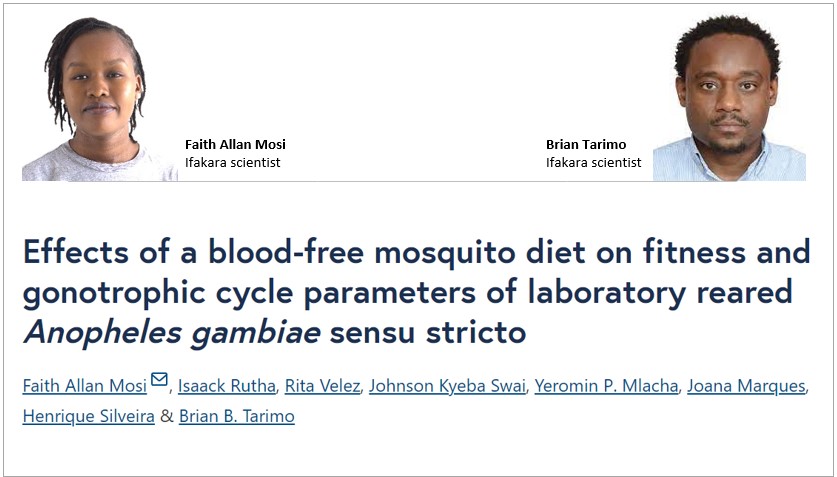
RESEARCH: Scientists find alternative for feeding mosquitoes in labs

Scientists have been exploring artificial blood-free diets as an alternative to using animal blood for rearing mosquitoes in laboratories. One such diet, known as BLOODless, has shown remarkable promise, according to scientists from the Ifakara Health Institute and Global Health and Tropical Medicine (GHTM).
Unique, ethical alternative diet
BLOODless, a unique blood-free diet, is set to address ethical, logistical, and safety concerns associated with traditional animal blood meals, paving the way for more efficient and ethical research methods aimed at combating malaria and other mosquito-borne diseases.
The blood-free diet is the only one available for rearing malaria mosquitoes that does not require blood or fresh blood derivatives and mimics the standardized blood meal in terms of mosquito production.
Over the years, efforts in malaria control have led to the development of innovative tools such as genetically engineered mosquitoes. These efforts require breeding many healthy, mosquitoes with normal behavior and physical fitness, a process which currently depends on vertebrate blood – a practice facing various challenges. However, this study shows that BLOODless, an artificial diet, offers a feasible and ethical alternative.
Learn more about BLOODless here.
Remarkable effectiveness of BLOODless
The BLOODless diet showed remarkable effectiveness as demonstrated in the study, now published in the Parasites & Vectors journal.
A total of 1,000 mosquitoes over eight generations were examined in experiments conducted at the Ifakara Health Institute laboratory in Bagamoyo, Tanzania. The study compared BLOODless with traditional cow blood, fed to An. gambiae s.s. (IFAKARA) mosquitoes, a primary malaria vector.
The goal was to see if BLOODless could perform as well as bovine blood in terms of feeding rates, egg production, hatching rates, pupation rates, mosquito lifespan, and wing length. It successfully attracted female mosquitoes and supported crucial reproductive processes, such as egg production, a breakthrough that could revolutionize mosquito control strategies.
“Our study adds to the body of evidence that blood-free diets have the potential to substitute vertebrate blood in rearing mosquitoes in laboratories,” reported the scientists. “BLOODless proved to be effective in attracting female mosquitoes, supporting crucial reproductive processes, producing fit egg batches and showed normal mosquito biology.”
Promising results observed
The findings of the study revealed several significant insights. Both groups achieved similar feeding success rates, with blood-fed mosquitoes at 92.3% and BLOODless-fed mosquitoes at 93.6%.
In terms of reproductive parameters, the blood-fed mosquitoes laid more eggs per female compared to BLOODless-fed mosquitoes, while on fitness parameters, wing length and longevity were comparable between the two groups, indicating that the BLOODless diet did not adversely affect mosquito fitness.
Implications for mosquito control
The study highlights the potential of the BLOODless diet as an ethical alternative to vertebrate blood for mosquito rearing. The scientists underline that this breakthrough could reduce ethical concerns and streamline the logistics of mosquito mass production, enhancing the feasibility of innovative mosquito control strategies.
However, the scientists recommend further investigation with larger sample sizes and different mosquito species to examine the long-term effects of a BLOODless diet.
“Our study adds to the body of evidence that blood-free diets have the potential to substitute vertebrate blood in rearing mosquitoes in laboratories,” the scientists noted.
“Despite some of the promising results observed, further experimentation with larger sample sizes, various mosquito species and prolonged time frame are required on BLOODless before it can be definitively applied as an alternative to blood for rearing mosquitoes.”
Ifakara scientists lead the study
The study was led by Faith Allan Mosi from Ifakara Health Institute, with Joana Marques and Henrique Silveira from Global Health and Tropical Medicine (GHTM), and Brian Tarimo, also from Ifakara, contributing equally as last authors. Additional contributors included Isaack Rutha, Johnson Kyeba Swai, and Yeromin Mlacha from Ifakara, along with Rita Velez from GHTM.
Read the publication here.
